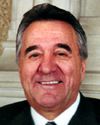Mr. Speaker, in the past two years, it has become common, if not systematic, to have reports of the standing committees of the House and the content of in camera discussions leaked to the media by Liberal members, before this information is officially tabled in the House. It was the case, over the past two weeks, with the report of the Standing Committee on Foreign Affairs on nuclear non-proliferation, the report of the Standing Committee on Canadian Heritage on amateur and professional sports, and the report of the Special Joint Committee on Child Custody and Access.
Such disclosure betrays the spirit and letter that must guide us in the tabling of reports from the Liberal majority, along with the dissenting opinions of the opposition parties in the House of Commons.
Yesterday evening, the report of the Standing Committee on Finance on prebudget consultations was no exception. It was leaked during the 10 p.m. CBC national news. The Liberal majority disclosed some information contained in the committee report which serves the interests of the federal government and which allowed the Minister of Finance to be in the limelight, to promote his tax reduction initiative and spout propaganda about the federal government's achievements.
This is contempt of the House, which may be punished. According to Maingot, in chapter 12, page 229:
Any act or omission which obstructs or impedes either House of Parliament in the performance of its functions, or which obstructs or impedes any Member or officer of such House in the discharge of his parliamentary duty, or which has a tendency, directly or indirectly to produce such results may be treated as a contempt even though there is no precedent for the offence.
The disclosure of a committee report or of the content of in camera discussions by members of these committees, before the opposition's dissenting opinions are prepared and all the information is tabled in the House of Commons, constitutes contempt of the House and is a serious breach of democracy.
The Liberals' way of doing things is also an unforgivable affront to the privileges of those parliamentarians who respectfully and honourably comply with a rule which, for all intents and purposes, practically no longer exists. This also hinders the work of members, who make themselves available for intensive consultations throughout the country for two months and who see the results of their efforts and those of all the witnesses who took part in the exercise reduced to nought for purely partisan reasons.
This disclosure of the report of the Standing Committee on Finance seriously undermines the credibility of the committee and of its members and creates an unhealthy working atmosphere in which suspicion and disrespect overshadow co-operation, loyalty and one's word of honour. In fact, confidentiality and honour no longer seem to hold much meaning for the Liberal members of the Standing Committee on Finance.
Faced with these troubling incidents, I respectfully ask you to tell the House whether the rule of confidentiality still applies to House of Commons committee reports before they are tabled and whether it is a rule we must observe out of respect for parliamentarism and democracy. That being the case, I ask you to consider the action taken by Liberal members of the Standing Committee on Finance as contempt of the House. And, should you agree that it is, I am prepared to move a motion in the House that would allow the Standing Committee on Procedure and House Affairs to conduct an inquiry.
If, however, it turns out that this rule of confidentiality is no longer a sacred precept of the parliamentary system, we will conduct ourselves accordingly in future. But it would be very unfortunate if that were the case, for the loss of this rule would strike a hard blow to democracy and to the credibility of this institution we all respect as parliamentarians.














